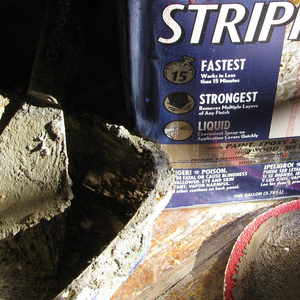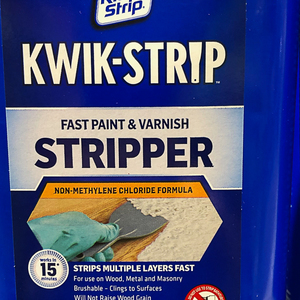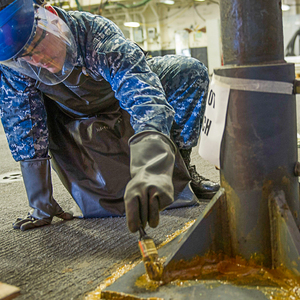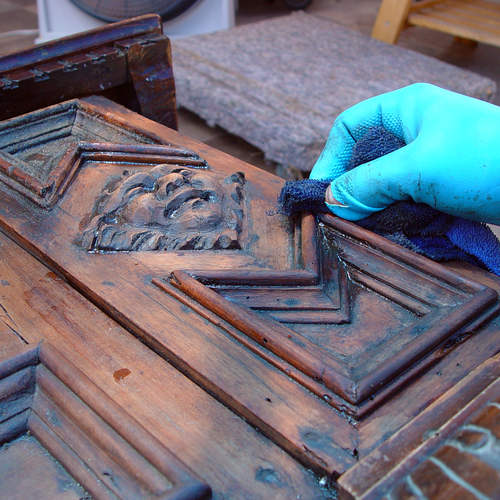
The U.S. Environmental Protection Agency has been sued for its failure to ban methylene chloride, a chemical used in some paint strippers that has been linked to a number of deaths.
E&E News reported that a group including the mothers of two men who died while using paint strippers containing the chemical filed suit in a federal district court in Vermont on January 14. The Vermont Public Interest Research Group, and Safer Chemicals, Healthy Families also are parties to the complaint. Andrew Wheeler, the acting administrator of the EPA, also is named in the complaint.
Methylene chloride is a common chemical in paint removers, the suit says, that is responsible for more than 50 deaths, as well as incapacitation, loss of consciousness, and coma in people who came into contact with it. Despite earlier promises to ban products that contain the chemical, the EPA has failed to follow through, the suit alleges, and has violated terms of the Toxic Substances Control Act.
The plaintiffs include Lauren Atkins of Pennsylvania and Wendy Hartley of Tennessee. Both had sons who died after using paint remover containing the chemical.
If the EPA has been slow to get the chemical off the market, a number of major U.S. retailers are acting on their own.
In December, Amazon announced that beginning in March it would no longer sell paint removers containing either methylene chloride or a compound called NMP. A number of other retails had already taken that step, including The Home Depot, Lowe’s, Walmart, True Value and AutoZone.
In an email earlier this month, GBA asked the EPA’s press office when the agency could be expected to issue new rules on methylene chloride. The office said that “due to a lapse in appropriations,” it would only respond to questions about the government shutdown or an environmental emergency that threatened human life.
Weekly Newsletter
Get building science and energy efficiency advice, plus special offers, in your inbox.















6 Comments
Q: Has anyone suffered injuries or death from using the product as directed?
John,
Did you even read the article and lawsuit it was linked to?
"The Risk Assessment concluded that acute (short-term) exposure to MC paint strippers presents an increased risk of 'odeath, neurological impacts such as coma, incapacitation,
Case 2:19-cv-00009-jmc Document 1 Filed 01/14/19 Page 8 of 14
loss of consciousness, and dizziness; and liver effects," and that chronic (long-term) exposure to those products presents an increased risk o'brain, liver, lung, and hematopoietic cancers and liver damage." [n many of the use scenarios analyzed in the Risk Assessment, worker and bystander exposures to MC from paint strippers were hundreds of times greater than the margins of exposure ("MOEs") that EPA deems safe."
Yes, I read the article which is why I included "as directed" in my question. There are lots of chemicals which can injure/kill you. For example one summer I worked for a company which manufactured truck axles (18 wheeler, dump trucks, etc) and they were painted by hand. The thinner in the paint was highly toxic so I made sure to use the proper brand new canister with my respirator when I was in the paint booth.
When I was a tech (Hazmat certified) and collected water samples at super fund sites or refineries we made sure to wear the proper gloves because you didn't want to get the water on your skin.
Is this a case where the product needs to be banned because people who use the product simply refuse the take the proper precautions or is it a labeling issue or both?
Silica dust is a problem but it doesn't stop people from cutting concrete or cement board with out a respirator. Are we going to ban cement board?
I do recall reading about at least one case where someone wearing a full respirator died.
There's a question of what is a reasonable amount of precaution to expect an average person to take. Yes, there are plenty of hazardous products on the market. But there are also plenty of controlled substances that you simply cannot buy without holding some kind of license or certification (highly radioactive materials, chemicals that destroy DNA, etc).
Let's compare the cement board to the paint stripper. With the former, if you decide not to bother with the respirator one time, the possible consequences are getting sick many years later (and based on one incident, not very likely). With the latter, that one lapse in judgement could result in your immediate death within minutes. There's a definite difference in the threat level there that shouldn't be glossed over.
Thanks. Sounds like the average consumer doesn't have the proficiency required to use the product safely.
Banning everything isn’t the answer either, nor is licensing. It is not possible to regulate away all hazards and dangers. Some people will always get hurt. There are many electrocutions each year too, but no one is going to be advocating banning electricity.
It is necessary to use reasonable caution. I remember years ago on a job I smelled what I thought was methyl ethyl ketone. I looked around and found a can — the maintenance guys were using it as a floor stripper. My crew wondered how I knew what it was, and I told them that now that they’d smelled it, they’d always recognize the smell too. I sent everyone home that day to avoid any risk from the fumes (we were installing network cabling in the building).
I agree it may be wise to discourage the sale of the more hazardous products through regular retail channels and sell them mainly at contractor supply houses. It seems it’s usually the homeowner/DIY people that get hurt with these things.
Bill
Log in or create an account to post a comment.
Sign up Log in